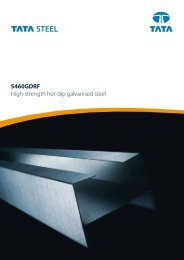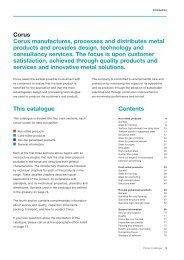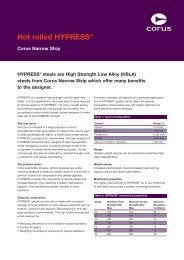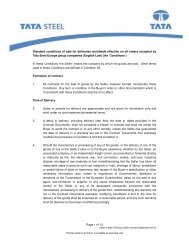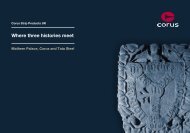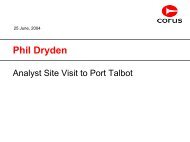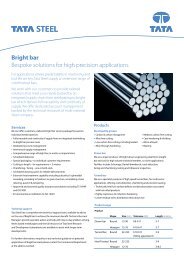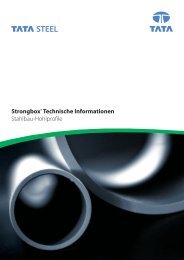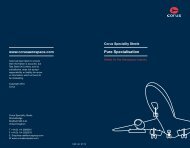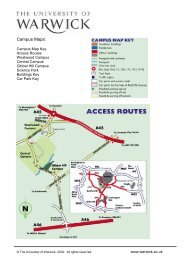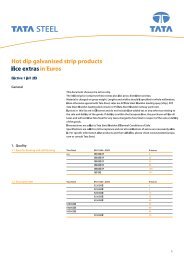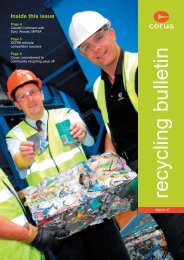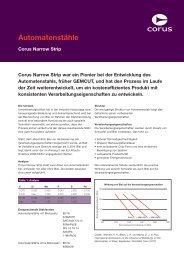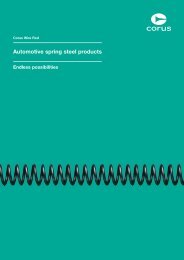Corporate responsibility report 2004 - Tata Steel
Corporate responsibility report 2004 - Tata Steel
Corporate responsibility report 2004 - Tata Steel
Create successful ePaper yourself
Turn your PDF publications into a flip-book with our unique Google optimized e-Paper software.
Managing corporate Case <strong>responsibility</strong> study<br />
Scrap supplier radioactivity<br />
detection audits<br />
At the end of <strong>2004</strong>, we published<br />
a Corus-wide standard on ionising<br />
radiation and radioactive substances.<br />
The main objective of this standard<br />
is to prevent radioactive scrap and<br />
orphan radiation sources from entering<br />
Corus sites. Amongst other things,<br />
scrap suppliers are required to monitor<br />
for the presence of radioactivity at their<br />
own sites and these arrangements have<br />
to be audited by us.<br />
Corus Strip Products, IJmuiden<br />
in the Netherlands, has pioneered<br />
work in this area and only works with<br />
scrap suppliers and trans-shipment<br />
companies which have detection<br />
systems at their sites. Audits were<br />
undertaken during <strong>2004</strong> in the<br />
Netherlands, Germany and<br />
Luxembourg and will have been<br />
extended to all scrap suppliers,<br />
including those in Belgium and the UK,<br />
by the end of 2005. The audits cover<br />
detection equipment capability and<br />
set-up, frequency of calibration and<br />
procedures if and when alarms are<br />
sounded, as well as competence and<br />
training of scrap supplier personnel.<br />
After an audit, feedback is given to the<br />
supplier and an action plan is agreed<br />
to improve the situation if necessary.<br />
The intention is to repeat these audits<br />
on a regular basis.<br />
Case study<br />
Safety and health excellence<br />
programme for group senior<br />
management leadership training<br />
In order to further improve health<br />
and safety performance, our Executive<br />
Committee is sponsoring a safety and<br />
health excellence programme for group<br />
senior managers (GSMs). Its purpose<br />
is to identify the health and safety<br />
leadership behaviours that we require<br />
from our senior management. The<br />
programme runs over two days, with<br />
inputs from Corus, Dupont, and an<br />
in-house training organisation based<br />
at Ashorne Hill. The course is highly<br />
interactive and covers root cause<br />
thinking, contractor management<br />
(including a video made by contractors<br />
explaining what it is like to be a<br />
contractor working for Corus),<br />
leadership and behaviour, turning<br />
policy into practice and commitment.<br />
Health and safety plans are scored<br />
using the Corus maturity tool for<br />
measuring improvement and delegates<br />
are then taken through the ‘GSM<br />
Commitment’, which is a personalised<br />
brochure containing an assessment of<br />
their current health and safety activities<br />
and behaviours. This is converted into<br />
commitments which each GSM is<br />
required to agree and sign off with<br />
their manager.<br />
<strong>Corporate</strong> <strong>responsibility</strong> <strong>report</strong> 9



